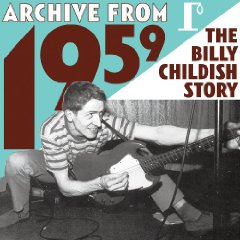‘I never went away… I’m not like some band coming back to take advantage of bullshit nostalgia. I mean, I’m someone who’s always tried systematically to destroy the very basis of my record-buying public. My whole career is based on systematic destruction. For years and years. See, that’s what keeps me alive. You destroy what you did before and you’re free to carry on’ (Neil Young and the haphazard highway: Nick Kent).
To keep on moving or to stake a claim, this is the dilemma. Keep rolling, keep changing, keep shifting with the curve of the road and the roll of the horizon. Or stop. Pick your spot and mark your place. Looking from a distance you might place the 32 year career of Billy Childish in the latter camp, given the obdurate consistency with which he has presented his myriad variations on a spitting, stripped back and consciously grubby garage-rock formula. Childish has the sort of back catalogue that makes the compilation and career retrospective a necessity instead of a possibility, so it’s no surprise that this is the third of one form or another in seven years. 100 odd albums or so, the bio goes, and sometimes it seems, enough monikers to match that number. The extensive roll call has included the Pop Rivets (inspiration: ‘punk rock, TV 21, the swinging blue jeans’) The Milkshakes (‘Link Wray, the Beatles live at the Star Club LP, the track ‘Last Plane Home’ by The Kinks, our hatred of new romanticism’), Thee Mighty Ceasars (‘Bo Diddley and The Troggs’) Thee Headcoats (‘the downliners sect’) The Buff Medways (‘early Jimi Hendrix and The Daggerrmen’), and his current outfits, the Musicians of the British Empire and The Chatham singers. Yet despite the intermittent peaks of interest that a more celebrated musician’s public recommendation will occasionally bring, his popularity or standing hasn’t fluctuated too much over these thirty years. The rutted path he wanders up and down is eroded by a dogged belief in honesty and principle above popularity and pretension. The Milkshakes were once told that they were committing commercial suicide by releasing too many LPs, so their answer was to release four in a single day.
Archive From 59 then is an attempt to introduce the uninitiated, and also serves as another collection for those already familiar with his work – some of these tracks being released on CD for the first time. The 51 tracks serve up Childish’s various musical methods, mostly focusing on the scabrous punk, chugging 60s Brit-beat, howling estuary blues and feral garage-rock. We’re also treated to some insouciant Gallic girl-pop along the way in the form of the Delmonas.
The themes and preoccupations that span his creative output can all be found within in his songs. There’s the constant presence of Chatham, where he was born and still resides, the caustic wit and incisive turn of phrase, the confessional pawing at wounds, the bile flecked admonishments at a world he can’t quite abide by. That is reflected, of course, by an exploration of his own flaws and warts as much as anyone else’s. But there are also intermittent bouts of tenderness, often diseased and cracked and skewed, but tender nonetheless. The album doesn’t quite feel as representative as previous hits package 25 Years Of Being Childish, and it’s a shame that the decision has been made not to include any poetry, as his speaking voice with its intermittent punching of the initial letters of words, and curling sibilant sounds, is utterly mesmerising. But at the same time, this feels like an attempt at a tighter, more focused compilation, a little more raucous the whole way through.
The scrappy, belligerent, inimitable Childish way, it’s all a stance that almost borders on a form of asceticism; he’s set up his parameters and will live and die by them and fuck the rest. As he has said "I’ve no doubt that listening to myself and painting the way I wanted, riting poetry and playing music, the way I wanted were a balm, all-be-it blood-soaked and pussy, and even then I felt myself tracked by God". This feverish insistence on ploughing the same largely forgotten field has provoked accusations of a tired and dogmatic repetitiveness. But Childish proves that it’s possible to plant your flag and still retain a rattling and roaring forward momentum, an ability to tear up and start again, violently cast aside the last thought for fear it will obfuscate the next, and in turn, gain an understanding of the heady freedom and satisfaction that limitation can bring. During a recorded gig at The Dirty Water Club in 1998 with Thee Headcoats (an album that the sleeve tells us was captured ‘by Wolf and Billy on a ferrograph ¼ track’), Childish starts to introduce the next song. "We’re gonna carry on with the Bo Diddley theme now", he informs the audience, "and it’s as good as anyone’s ever came up with". Accompanied by Medway Wheelers by the Buff Medways, a tome of his poetry, this compilation would make for a fine introduction to one of the greats.


